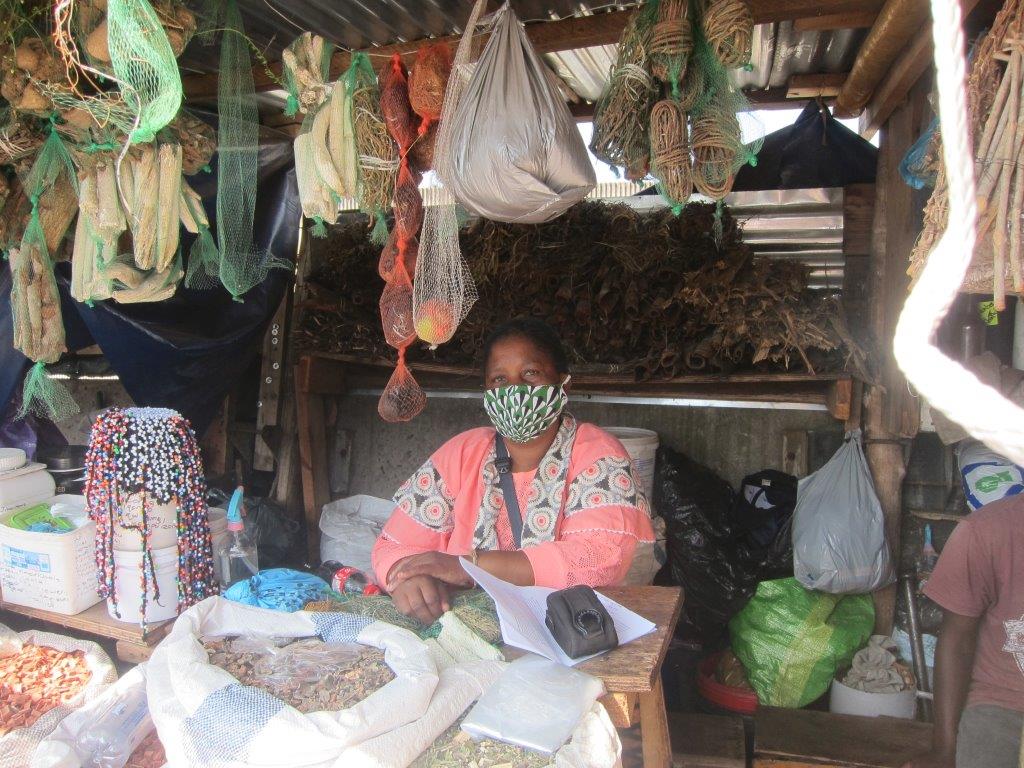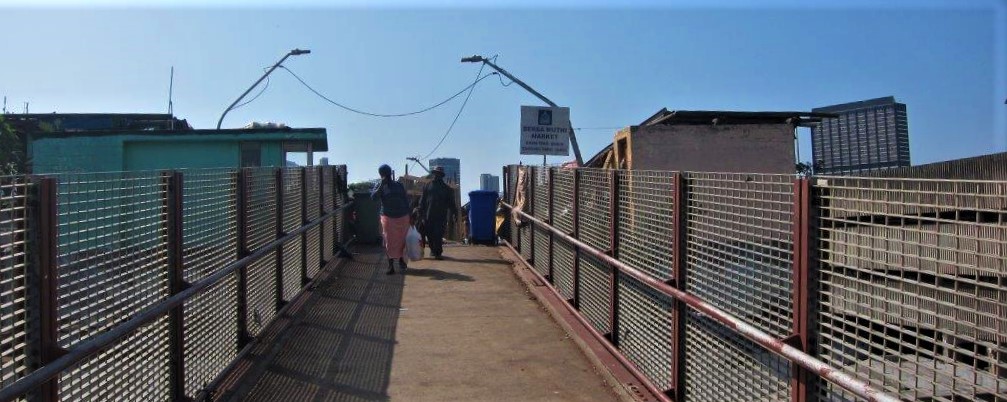Misiwe Maphumulo & Sarah Heneck
A WIEGO-led COVID-19 Crisis and the Informal Economy survey was conducted in 12 cities worldwide, with the aim of assessing the impact of the pandemic on informal workers. Asiye eTafuleni (AeT) surveyed 185 informal workers across three sectors in Durban, namely, waste pickers, market traders and street traders.
The COVID-19 pandemic has been devastating for informal workers, who have limited access to resources and no social protection. During the initial lockdown they were faced with an impossible choice: either comply with the restrictive lockdowns and risk starvation or go to work and risk infection and police harassment and brutality.
Findings from this study, outlined in the Durban factsheet compiled by WIEGO, reveals the negative socio-economic impact on informal workers during the initial months of restrictions in South Africa, however the impact of the pandemic is still being felt by informal workers. Read recent stories from…
A mother
Nozimbele sells cosmetics on the streets of Warwick Junction, and alongside her while she works, sit her two small children. Prior to lockdown she would leave her children in the care of her neighbour who runs an informal creche from her home. Nozimbele used to earn up to R400 a day, but now “it is a battle to earn R50,” so she can longer afford to pay for childcare. She is a single mother from the Eastern Cape and has no family in Durban so she is forced to bring her children to work with her. There is no protection at her trading site so her children are exposed to the elements all day. She also worries about their safety on the streets. Only one of her children has a birth certificate, so she only receives one Child Support Grant payment per month. For the past few months she has been borrowing money from her co-workers so that she can eat.
This is a reality for many informally working mothers’. AeT has therefore broadened their scope of work to respond to evolving urban needs such as childcare. Since 2016 AeT has been collaborating with organizations across the world in order to generate ideas around childcare for informal workers. AeTs focus has been on ‘creating safer spaces’ in informal workplaces. These spaces are intended as an alternative childcare option for informal workers who usually bring their children to work with them due to a lack of affordable, accessible childcare.
A bead seller
Although it does not occupy a large space in Warwick Junction, the bead market pre-COVID was always a bustling hub on Friday’s, bursting with all the colours of the rainbow whichever direction one cast one’s eyes. There is a stark contrast between this scene from a year ago and the current one. COVID-19 restrictions have been devastating for the bead sellers, who rely mainly on tourists, or on local customers purchasing attire for traditional events such as weddings. The dearth of international travellers and the restrictions on events, have led to such a major decline in income for sellers that many of them cannot afford to restock and therefore they cannot come to work. Sellers without permits or those who have fees outstanding have also been barred from entering the market.

Qondeni Shozi has been trading at the bead market since 2002. Prior to the pandemic, she could make up to R2500 every Friday. She was also part of a group of women hired by the Department of Arts and Culture to travel around South Africa to teach other people their beadwork skills. For the past few months she has made no money at all, and has been relying solely on the child support grants she receives for her three youngest children, aged 3, 7 and 8. This means that the money she now uses to support herself and her children every month is less than the amount she used to earn in a week.
COVID-19 caused the death of three of the bead sellers in the market. As is it a small community of women who work there, the death was painful for the remaining traders. One of Qondeni’s children contracted coronavirus, thankfully it was a mild case, but Qondeni is very afraid of the virus and the affect it may have on her. An organization has provided her and her fellow traders with masks and hand sanitizers but she fears for her safety when she travels to work because so many of the other passengers on the taxi’s don’t wear masks. Qondeni is also afraid of the vaccine as she has heard a lot of information which makes her feel that it may cause her harm. Nevertheless, she is hopeful that the vaccine will allow tourists back into the country, and she will be able to share her beautifully crafted creations with the world once again.
A women recycler
The choice between going hungry or risking contracting COVID-19 is a terrible one, but it doesn’t take long to make. “The money that I would use to buy a mask, I need it to buy bread.” So instead, Nompumelelo Makhathini picks up masks that she finds on the streets, disinfects them and uses them again. This informally working mother used to collect recyclable materials such as aluminum cans, plastic and glass bottles at events around Durban. Since the beginning of the pandemic, no events have taken place and she and her family have been struggling to survive. Nompumelelo’s dream for the future is for the municipality to recognise the value of the work that she does,
“What we do is so important. We clean up the environment and protect the sea.”
– Nonkuleko

Women recyclers meeting. Palmer Street Recycling Facility, Durban. Photo: Toni Ottanelli-Gale 
Bovine Head Market, Warwick Junction, Durban. Photo: Misiwe Maphumulo
A cook
Bovine head meat, served with fresh bread and chili, is a traditional Zulu meal and the 22 women who work at the Bovine Head Market in Warwick Junction could serve up to 300 of these meals daily before lockdown. Now, compounding factors have led to a drastic decline in their income, namely; a decrease in customers due to so many people losing their jobs, an increase in the prices of the meat and cleaving equipment, as well as an increase in the number of bovine meat sellers in the area due to the lack of other job opportunities. Xoli, a Bovine Head cook, wishes that there were more jobs available for the youth, and that schools would reopen properly. “The pandemic has made our kids wild,” because when they are not at school they are taking drugs and causing trouble and she worries about their safety. She also worries about contracting the virus but has no choice other than to continue working because she has to feed her family.
A market trader
The WHO recently endorsed the trial testing of traditional African medicine as a potential treatment for COVID-19. At the Traditional Herb and Medicine Market in Warwick Junction, one can find remedies which are believed to have healing benefits for all ailments. In order to keep their market open during the lockdown, Nokuthula and her fellow traders took the initiative and decided that they would allocate specific days for specific traders to work, and they also hired two security guards to monitor the amount of people coming into the market and to sanitize their hands. While they have succeeded in keeping their livelihoods afloat for the past year, Nokuthula fears for the future of the market because she, and many other traders, are in such dire straits financially. Nokuthula, who has been trading in this market since 2000, usually buys her stock on credit but because her suppliers are also struggling, they are requesting cash up front, which she doesn’t have much of any longer.

A barrow operator
The informal economy is sometimes referred to as the “shadow economy” and there are no informal workers who exist more in the shadows than barrow operators. Barrow operators use non-motorized trolleys to transport goods between suppliers, storage facilities, and the informal traders who sell them to the public.
Lonwabo has been working as a barrow operator in Warwick Junction for 25 years. Although he had no work during the hard lockdown he did not register for the relief fund, “I’m still young, I should make my own money, I fear what that free money will bring.” When lockdown measures were eased he went back to work and has managed to keep himself fed, but business is still very slow; “It feels like the country is still closed.”
As well as working as an informal trader, Ndlovu operates one of the main storage facilities in Warwick Junction. During the lockdown, most traders couldn’t afford to pay to store their stock in his facility, so he waived their fees. He sees people struggling on the street everyday, making as little as R10 and that makes him feel like “the future of these businesses is fading away.” Although he is afraid of the virus he also doesn’t trust the vaccine and worries that it will either kill him or allow the government to control him.
Although it may feel to many people who have a more stable income that we have returned to some degree of normality, these stories highlight how the pandemic continues to affect informal workers, almost a year to the day since we went into our first COVID-19 related lockdown. COVID-19 is likely to be with us for a long time to come; it is imperative that the struggles of these vital workers are recognised. To see sector recommendations, see page 15 of the Durban factsheet. AeT has consulted with a reference group (made up of informal workers), and a dissemination process is underway to ensure there is meaningful engagement with relevant stakeholders in this regard.
Part 2 – coming soon.
[Feature image: Bridge to Herb Market. 2021. Warwick Junction. Photo: Misiwe Maphumulo]


